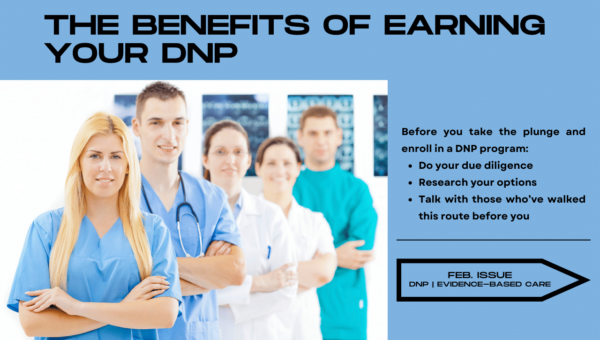A nursing career offers many avenues for nurses of all stripes and interests to fulfill their professional goals. For some, earning a doctorate is a lifelong aspiration that they are keen to fulfill, and nursing offers three options for this accomplishment: the DNP, the PhD, and the Doctor of Nursing Science (DNS or DNSc).
Doctoral programs offer what is frequently referred to as “terminal” degrees since they represent the highest possible level of educational achievement in most disciplines (some areas lack a doctoral option. Thus, the master’s becomes the default terminal degree). Considering that a DNP is generally clinically oriented, and a PhD and DNS are geared towards academia and research, a nurse wishing to take their clinical knowledge and education to the highest pinnacle would do well to look at the DNP as a very promising direction.
If you’re wondering about the benefits of earning your DNP, there’s no time like the present to explore the career potential and professional development that such a high-level educational accomplishment can confer on your nursing career.
A Rigorous Education
One clear benefit of earning a DNP is that it offers an unequaled rigorous clinical training pathway. In some DNP programs, you can choose a clinical nurse specialist or educator track, or you can choose to focus on direct patient care as an expert clinician.
Your DNP program will provide a much deeper dive into the theory and science driving evidence-based advanced nursing practice. Your education may also steer you into organizational leadership, systems thinking, IT and technological advances in nursing and medicine, healthcare policy and advocacy, and quality improvement.
This form of doctoral education will enrich your understanding and professional perspective on multiple aspects of patient care, preventive medicine, population and community health, and other areas of study. Depending on the focus of the DNP program you choose, you may also gain a keener grasp of emerging ideas in nursing and medical science, the effects of climate change and the environment on populations around the world, the social determinants of health, and other trends to keep an eye on in the years to come.
With the promise of the most extensive clinical training possible for a nurse, doctoral education can open your mind and help you look at the world around you with a more discerning, critical, and perceptive eye. It will also deepen your understanding of identifying trends that can impact how you practice, the state of the broader healthcare system you are a part of, and your patient’s health and the well-being of larger communities and populations, including the most vulnerable.
DNP Earning Power and Job Opportunities, and Professional Parity
The Doctor of Nursing Practice designation demonstrates to your colleagues, your patients, and the world that you have pushed yourself to achieve the highest possible level of education as a nurse, accumulating more extensive knowledge and expertise.
In many job markets, nurses with a doctoral degree can sometimes command higher salaries than some of their masters-prepared counterparts. According to Payscale, DNPs earn an average of $112,000 annually, and NPs earn an average of $106,413, an arguably nominal difference.
However, CRNAs can expect to earn an average annual salary of $179,343. And since a DNP will be the entry-level degree for all CRNAs as of 2025, newly enrolled CRNA students have been automatically enrolled in DNP programs since 2022.
When applying for executive leadership positions, candidates with a doctoral education can have an advantage over their masters-prepared colleagues since a DNP education provides advanced training in organizational management, systems thinking, and the leading of multidisciplinary teams. Executive leadership positions include chief nursing officer (CNO), patient care director, nursing home administrator, director of nursing, or chief nursing information officer. As far as earning power, a CNO can expect to earn an average of $141,000 per year.
Professional Parity
Since many healthcare colleagues — including MDs, dentists, and physical therapists — are required to achieve a doctorate, earning your DNP can provide you with professional achievement and equality of standing regarding professional parity.
As a nurse with a DNP, you will find yourself collaborating with multidisciplinary colleagues, often in a leadership position. A doctoral degree can bestow a feeling of self-respect and the right to expect and demand equal treatment as a highly educated, knowledgeable, professional healthcare leader.
Achieving Your Highest Goals
Nurses are all individuals whose personal circumstances and preferences dictate what level of education will bring them a sense of achievement and satisfaction. An aversion to accumulating student loan debt can be enough of a deterrent for some nurses to advance their education. For some, an ADN, BSN, or MSN is enough to scratch their educational itch, and the idea of a doctorate feels foreign, excessive, or simply unnecessary to reach their career goals.
However, there are always some ambitious nursing professionals whose eyes have always been on the prize of a doctorate, whether for personal achievement, professional advancement, or a combination of these and other motivating factors. Doctoral education is an intense and enriching educational experience that some individuals look forward to with relish and excitement, if not a healthy dose of trepidation at the amount of work that completing their education will entail.
Whether for personal reasons, professional advancement, earning power, career mobility, professional parity, or simply as a quest for knowledge, earning a DNP can deliver a unique sense of accomplishment for each individual.
Only you can decide if the DNP pathway is right for you and your career. Before you take the plunge:
- Do your due diligence.
- Research your options.
- Talk with those who’ve walked this route before you.
There are many benefits to earning your DNP, and you can make a prudent decision once you’re armed with enough information to choose from a place of wisdom and certainty.
Sign up now to get your free digital subscription to Minority Nurse.
- The Road to Becoming an FNP - April 22, 2024
- Embracing Cultural Competence and Cultural Safety - April 17, 2024
- Advancing Your Nursing Career Through Certifications - March 25, 2024



